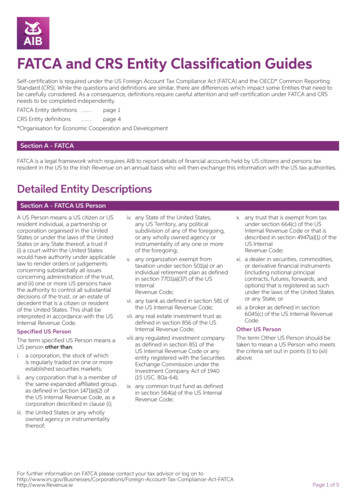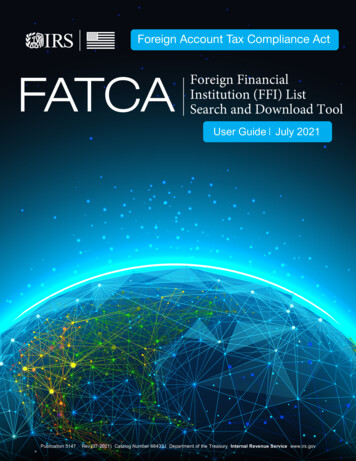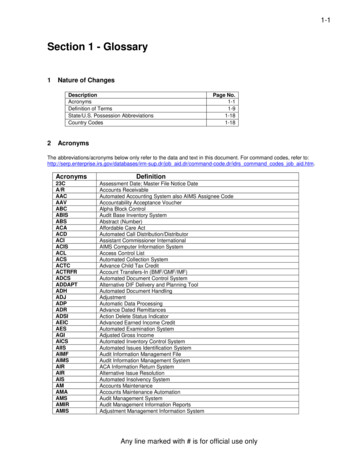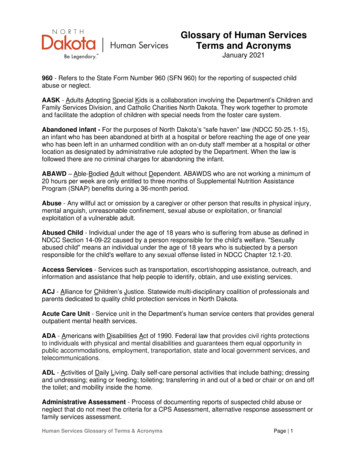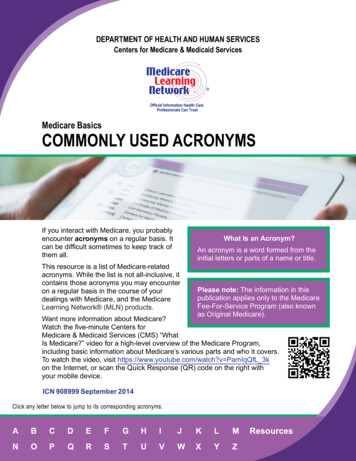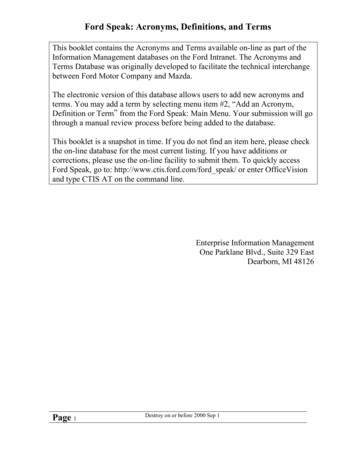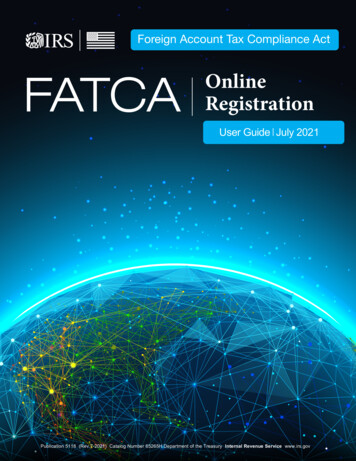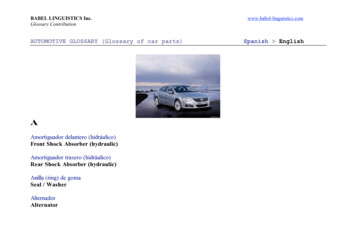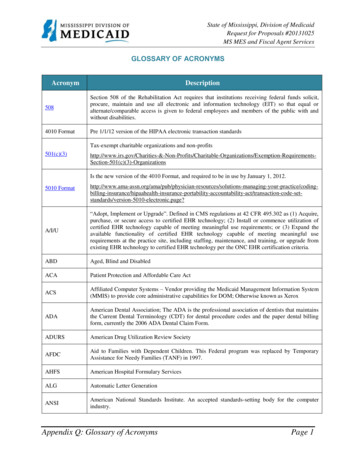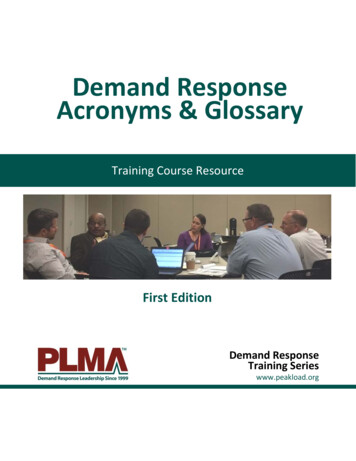
Transcription
Global Financial Services IndustryFATCA glossary of acronymsClosing the distanceDescription and definitions of words and acronyms associated with ForeignAccount Compliance Act (FATCA).00
FATCA glossary of acronyms Table of contentsTable of contentsAccount . 3FATCA . 5Account holder . 3FATCA . 6Active NFFE . 3FATCA registration portal . 6AML . 3FATF . 6AML due diligence . 3FATF-compliant . 6Beneficial owner. 3FDAP . 6Broker . 3FDAP income . 6Certified deemed-compliant FFI . 3FFI . 6CFC . 3Foreign financial institution (FFI) 6Chapter 3 . 3FFI agreement . 6Chapter 4 of the InternalRevenue Code . 3Financial account . 6Indicia . 8Intermediary. 8Intermediary withholdingcertificate . 8IRS . 8ISDA. 8KYC . 8Limited branch . 8Limited FFI . 8NFFEs . 9Financial Institution (FI) . 7Non-financial foreignentity (NFFE) . 9Financial account . 7Nonparticipating FFI . 9Flow-through entity. 7Nonqualified Intermediary (NQI) 9Complex trust . 4Flow-through withholdingcertificate . 7Nonqualified intermediarywithholding statement. 9Custodial account . 4Foreign entity . 7NPFFI. 9Customer master file . 4Foreign passthru payments . 7NQI . 9Deemed-compliant FFI . 4Foreign payee . 7NWP . 9Depository account. 4Foreign person . 7Documentary evidence . 4FWP . 7Non-withholding partnership(NWP) . 9Documentation . 4FWT . 7NWT . 9Dormant account . 4GIIN. 7Non-withholding Trust (NWT) . 9ECI. 4Global Intermediary IdentificationNumber (GIIN) . 7Offshore obligation . 9Grandfather obligations . 7PFFI . 9Grantor trust . 7Participating FFI . 9Entity . 5Gross proceeds . 8Participating FFI group . 9Excepted NFFE . 5HIRE Act . 8Partnership . 9Exempt beneficial owner . 5Insurance company . 8Passive NFFE . 9Expanded affiliated group . 5IGAs . 8Passthru payment . 9Chapter 4 reportable amount . 3Chapter 4 status . 4Chapter 4 withholding . 4CIP . 4EIN . 4Electronically searchableinformation . 501FI . 7Intergovernmental agreements(IGAs). 8OID . 9Back to top
FATCA glossary of acronyms Table of contents02Payee . 9Qualified intermediary (QI) . 10USWA . 11Payor. 9QI agreement . 10US Account . 11Person . 10Recalcitrant account holder . 11US Indicia. 11PFIC . 10Recalcitrant NFFE. 11US Owned Foreign Entity . 11Possession of the United States 10Recipient . 11US Person . 11PPP . 10Responsible Officer . 11USFI . 11Pre-existing account . 10SEC. 11Withholding . 11Preexisting entity account . 10SICAV . 11Withholding agent . 12Preexisting individual account . 10SPE . 11Withholdable payment . 12Preexisting obligation . 10Specified US Person . 11WP . 12Presumption rules . 10SPV . 11WT . 12Prima facie FFI . 10Substantial US Owner. 11QFFI . 10TIN . 11OID . 10Tax Identification Number . 11QI . 10USD . 11Back to top
FATCA glossary of acronyms Table of contentsTerms/AcronymsDefinitionAccountSolely for purposes of Chapter 4 of the Internal Revenue Code, account means afinancial account as defined in Treas. Reg. §1.1471-5(b) and includes a depositoryaccount, custodial account, any equity or debt interest in a financial institution, anycash value insurance contract and any annuity contract issued or maintained by afinancial institution.The term account holder is the person listed or identified as the holder or owner ofthe account with the FFI that maintains that account, regardless of whether theentity is a flow-through entity.An active NFFE is any entity that is a NFFE if less than 50 percent of its grossincome for the preceding calendar year is passive income and less than 50 percentof the weighted average percentage of assets (tested quarterly) held by it areassets that produce or are held for the production of passive income (i.e.,dividends, interest, annuities etc.)Anti-Money LaunderingThe term AML due diligence means the customer due diligence procedures of afinancial institution pursuant to the anti-money laundering or similar requirementsto which a financial institution, or branch thereof, is subject. This includesidentifying the customer (including the owners of the customer), understanding thenature and purpose of the account, and ongoing monitoring.The term beneficial owner means the person who is the owner of the income fortax purposes and who beneficially owns that income. Thus, a person receivingincome in a capacity as a nominee, agent or custodian for another person is not thebeneficial owner of the income.The term broker means any person, US or foreign, that, in the ordinary course of atrade or business during the calendar year, stands ready to effect sales to be madeby others. A broker includes an obligor that regularly issues and retires its owndebt obligations, a corporation that regularly redeems its own stock, and a clearingorganization that affects sales of securities for its members. A broker does notinclude an international organization that redeems or retires an obligation of whichit is the issuer, a stock transfer agent that records transfers of stock for acorporation if the nature of the activities of the agent is such that the agentordinarily would not know the gross proceeds from sales, an escrow agent thateffects no sales other than such transactions as are incidental to the purpose ofescrow (such as sales to collect on collateral), or a corporation that issues andretires long-term debt on an irregular basis.A certified deemed-compliant FFI means an FFI that has certified as to its status asa deemed-compliant FFI by providing a withholding agent with the documentationapplicable to the relevant deemed-compliant category. A certified deemedcompliant FFI is not required to register with the IRS.Controlled Foreign CorporationFor purposes of Chapter 4 of the Internal Revenue Code, any reference to Chapter3 means Sections 1441 through 1464 and the regulations thereunder, but does notinclude Sections 1445 and 1446 and the regulations thereunder, unless the contextindicates otherwise.The term Chapter 4 of the Internal Revenue Code means Sections 1471 through1474 and the regulations thereunder.Account holderActive NFFEAMLAML due diligenceBeneficial ownerBrokerCertified deemedcompliant FFICFCChapter 3Chapter 4 of theInternal RevenueCodeChapter 4reportable amount03The term Chapter 4 reportable amount means an amount reportable on a Form1042-S for purposes of Chapter 4 of the Internal Revenue Code (Sections 14711474). This means US source FDAP income (regardless of whether subject towithholding under Chapter 4 and including a passthru payment that is US sourceFDAP income); gross proceeds subject to withholding under Chapter 4; and foreignpass-thru payments subject to withholding under Chapter 4.Back to top
FATCA glossary of acronyms Table of contentsTerms/AcronymsDefinitionChapter 4 statusThe term Chapter 4 status means, with respect to a person, the person’s status asa US person, a specified US person, a foreign individual, a participating FFI, adeemed-compliant FFI, a Model 1 FFI, an exempt beneficial owner, anonparticipating FFI, a territory financial institution, a QI branch of a US financialinstitution, an excepted NFFE or a passive NFFE.Refers to the 30% FATCA withholdingChapter 4withholdingCIPComplex trustCustodial accountCustomer mentaryevidenceDocumentationDormant accountECIEIN04Customer Identification ProgramA complex trust is a trust that is not a simple trust or a grantor trust.The term custodial account means an account for the benefit of another personthat holds any financial instrument or contract held for investment (including, butnot limited to, a depository account, a share or stock in a corporation, a note,bond, debenture or other evidence of indebtedness, a currency or commoditytransaction, a credit default swap, a swap based upon a non-financial index, anotional principal contract, an insurance or annuity contract, and any option orother derivative instrument) for the benefit of another person.A customer master file includes the primary files of a participating FFI or deemedcompliant FFI for maintaining account holder information, such as information usedfor contacting account holders and for satisfying AML due diligence.The term deemed-compliant FFI means an FFI that is treated as meeting therequirements of Section 1471(b). Also includes a QI branch of a US financialinstitution that is a reporting Model 1 FFI.The term depository account means a commercial, checking, savings, time or thriftaccount, or an account which is evidenced by a certificate of deposit, thriftcertificate, investment certificate, certificate of indebtedness or other similarinstrument; and any amount held by an insurance company under an agreement topay or credit interest thereon.The term documentary evidence means documents, other than a withholdingcertificate or written statement that a withholding agent is permitted to rely uponto determine the Chapter 4 status of a person.The term documentation means withholding certificates, written statements,documentary evidence and other documents that may be relevant in determiningthe status of a person for the purpose of a reporting or withholding requirementunder Chapter 4 of the Internal Revenue Code, including any document containinga determination of the account holder’s citizenship or residency for tax or AML duediligence purposes or an account holder’s claim of citizenship or residency for tax orAML due diligence purposes.A dormant account is an account (other than a cash value insurance contract orannuity contract) treated as a dormant or inactive account under applicable laws orregulations or the normal operating procedures of the participating FFI that areconsistently applied for all accounts maintained by such institution in a particularjurisdiction. If neither applicable laws or regulations nor the normal operatingprocedures of the participating FFI maintaining the account address dormant orinactive accounts, an account will be treated as a dormant account if the accountholder (A) has not initiated a transaction with regard to the account or any otheraccount held by the account holder with the FFI in the past three years; and (B)has not communicated with the FFI that maintains such account regarding theaccount or any other account held by the account holder with the FFI in the pastsix years.Effectively Connected IncomeThe term EIN means an employer identification number (also known as a federaltax identification number).Back to top
FATCA glossary of acronyms Table of chableinformationThe term electronically searchable information means information that an FFImaintains in its tax reporting files, customer master files or similar files that isstored in the form of an electronic database against which standard queries inprogramming languages, such as Structured Query Language, may be used.Information, data or files are not electronically searchable merely because they arestored in an image retrieval system (such as portable document format (.pdf) orscanned documents).The term entity means any person other than an individual.The term excepted NFFE means an NFFE that is one of the following: (i) publiclytraded corporation whose stock is regularly traded on one or more establishedsecurities markets; (ii) certain affiliated entities related to a publicly tradedcorporation; (iii) any corporation that is a member of the same expanded affiliatedgroup as a corporation, (iv) certain territory entities that is directly or indirectlywholly owned by one or more bona fide residents of the same US possession underthe laws of which the entity is organized he term “bona fide resident of a USpossession” means an individual who qualifies as a bona fide resident); (v) anactive NFFE; (vi) excepted nonfinancial entities like holding companies, treasurycenters and captive finance companies that are members of a nonfinancial group;start-up companies; entities that are liquidating from bankruptcy; and non-profitorganizations; and (vii) direct reporting NFFEs and sponsored direct reportingNFFEs.The term exempt beneficial owner includes a foreign government, any politicalsubdivision of a foreign government or any wholly owned agency or instrumentalityof any one or more of the foregoing; any international organizations and anywholly owned agency or instrumentality thereof; any foreign central bank of issue;governments of US possessions; certain retirement funds; and entities whollyowned by exempt beneficial owners.A financial institution generally would be part of an “expanded affiliated group” thatincludes another financial institution if: (i) one financial institution controls theother financial institution directly or through a chain of controlled entities or (ii)they are both under the common control (directly or through a chain of controlledentities) of a single corporation (whether or not such corporation is a financialinstitution itself). FATCA defines an “expanded affiliated group” as an “affiliatedgroup,” as defined by Section 1504(a), but by substituting a more-than-50%ownership requirement for the at-least-80% ownership requirement in each placewhere it appears in Section 1504(a), and disregarding the Section 1504(b)(2)prohibition on including insurance companies in an affiliated group and the Section1504(b)(3) prohibition on including non-US corporations in an affiliated group. Italso includes partnerships and trusts if they are controlled, within the meaning ofSection 954(d)(3), by other members of the expanded affiliated group (includingother controlled partnerships or trusts). Under FATCA, all FFI entities that are partof a FFI’s expanded affiliated group must be a participating FFI or a registereddeemed-compliant FFI.The Foreign Account Tax Compliance Act (FATCA) is codified as Chapter 4 of theInternal Revenue Code. It represents the Treasury Department’s efforts to preventUS taxpayers who hold financial assets in non-US financial institutions (foreignfinancial institutions or FFIs) and other offshore vehicles from avoiding their US taxobligations. The intent behind the law is for foreign financial institutions (FFIs) toidentify and report to the IRS US persons holding assets abroad and for certainnon-financial foreign entities (NFFEs) to identify their substantial US owners. Inorder to comply with the rules, FFIs are required to enter into an FFI agreementwith the US Treasury or comply with intergovernmental agreements (IGAs) enteredinto by their local jurisdictions. US withholding agents (USWAs) must document allof their relationships with foreign entities in order to assist with the enforcement ofthe rules. Failure to enter into an agreement or provide required documentationwill result in the imposition of a 30% withholding tax on certain payments made tosuch customers and counter-parties. Failure to impose the requisite withholdingunder FATCA requirements could result in significant financial exposure.EntityExcepted NFFEExempt beneficialownerExpandedaffiliated groupFATCA05Back to top
FATCA glossary of acronyms Table of contentsTerms/AcronymsDefinitionFATCAFATCA registrationportalForeign Account Tax Compliance ActThe FATCA registration portal is a web-based tool that will be implemented tomanage all required registrations, agreements and certifications betweeninstitutions subject to FATCA requirements and the IRS.The term FATF means the Financial Action Task Force, which is an intergovernmental body that develops and promotes international policies to combatmoney laundering and terrorist financing.The term FATF-compliant means the relevant jurisdiction is not subject to a FATFcall on its members and other jurisdictions to apply counter-measures to protectthe international financial system from the on-going and substantial moneylaundering and terrorist financing (ML/TF) risks emanating from the jurisdiction; isnot a jurisdiction with strategic AML/CFT deficiencies that has not made sufficientprogress in addressing the deficiencies; and is not a jurisdiction with strategicAML/CFT deficiencies irrespective of whether the jurisdiction has agreed upon anaction plan with the FATF.Fixed, Determinable, Annual, PeriodicThe term FDAP income means fixed or determinable annual or periodic income.Includes interest, dividends, rents, royalties, commissions, fees and premiums.Foreign Financial InstitutionAn FFI is defined as any financial institution that is a foreign entity, other than afinancial institution organized under the laws of a possession of the United States.Financial institution means any entity that: (i) accepts deposits or other similarinvestments of funds in the ordinary course of a banking or similar business(Depository Institution); (ii) holds, as a substantial portion of its business, financialassets for the benefit of one or more other persons (Custodial Institution); (iii)primarily conducts trading in money market instruments, foreign currency, foreignexchange interest rate, and index instruments, transferable securities orcommodity futures; individual or collective portfolio management; or investing,administering or managing funds, money or financial assets on behalf of otherpersons (Investment Entity); (iv) is an insurance company or holding companywithin an expanded affiliated group that includes an insurance company, and theinsurance company or holding company issues, or is obligated to make paymentswith respect to a cash value insurance or annuity contract (Specified InsuranceCompany); or (v) is a holding company that holds stock in other members of itsexpanded affiliated group or treasury center that is part of an expanded affiliatedgroup that includes a depository institution, custodial institution, insurancecompany or investment entity, or is formed in connection with or availed of by a aninvestment vehicle established with an investment strategy of investing,reinvesting or trading in financial assets (Holding Company or Treasury Center).The term FFI agreement refers to an agreement between the IRS and theparticipating FFI. An FFI agreement includes a QI agreement, a withholdingpartnership agreement and a withholding trust agreement that is entered into by aFFI Model 1 FFI) that has an effective date or renewal date on or after June 30,2014.Section 1471(d)(2) defines a financial account as any depository account, anycustodial account, and any equity or debt interest in an FFI, other than intereststhat are regularly traded on an established securities market. It includes traditionalbank, brokerage, money market accounts, and interests in investment vehicles,and excludes most debt and equity securities issued by banks and brokerage firms,subject to an anti-abuse rule. It excludes certain savings accounts (including bothretirement and pension accounts and nonretirement savings accounts) that meetcertain requirements with respect to tax treatment and the type and amount ofcontributions. It also excludes any account that otherwise constitutes a financialaccount if it is held solely by one or more exempt beneficial owners or bynonparticipating FFIs that hold the account as intermediaries solely on behalf ofone or more such owners. Thus, a participating FFI need not determine whethersuch an account is a US account or held by a recalcitrant account holder.FATFFATF-compliantFDAPFDAP incomeFFIForeign financialinstitution (FFI)FFI agreementFinancial account06Back to top
FATCA glossary of acronyms Table of tion (FI)Financial InstitutionFinancial Institution - any entity that (i) accepts deposits in the ordinary course ofa banking or similar business, (ii) holds financial assets for the account of others asa substantial portion of its business, or (iii) is engaged (or holding itself out asbeing engaged) primarily in the business of investing, reinvesting, or tradingsecurities, partnership interests, commodities or similar financial instrumentsSection 1471(d)(2) defines a financial account as any depository account, anycustodial account, and any equity or debt interest in an FFI, other than intereststhat are regularly traded on an established securities market. It includes traditionalbank, brokerage, money market accounts, and interests in investment vehicles,and excludes most debt and equity securities issued by banks and brokerage firms,subject to an anti-abuse rule. It excludes certain savings accounts (including bothretirement and pension accounts and nonretirement savings accounts) that meetcertain requirements with respect to tax treatment and the type and amount ofcontributions. It also excludes any account that otherwise constitutes a financialaccount if it is held solely by one or more exempt beneficial owners or bynonparticipating FFIs that hold the account as intermediaries solely on behalf ofone or more such owners. Thus, a participating FFI need not determine whethersuch an account is a US account or held by a recalcitrant account holder.The term flow-through entity means a partnership, simple trust or grantor trust, asdetermined under US tax principles.Financial rtificateForeign entityForeign passthrupaymentsForeign payeeForeign mber (GIIN)GrandfatherobligationsGrantor trust07The term flow-through withholding certificate means a Form W-8IMY submitted bya foreign partnership, foreign simple trust or foreign grantor trust.A foreign entity is any entity that is not a US person, including a territory entity.The final regulations reserve on the definition of a foreign passthru payment.The term foreign payee means any payee other than a US payee.The term foreign person means any person other than a US person and includes,with respect to a withholdable payment, a foreign branch of a US person thatfurnishes an intermediary withholding certificate indicating that it is a QI.Foreign Withholding PartnershipForeign Withholding TrustsGlobal Intermediary Identification NumberA GIIN is the identification number used to identify the FFI for FATCA registrationpurposes and US information reporting purposes. This represents combination ofthe FATCA ID and FFI EIN that were outlined in the proposed regulations.Grandfather obligations are any obligation outstanding on July1, 2014 but does notinclude any legal agreement or instrument that: (1) is treated as equity for US taxpurposes (2) lacks a stated expiration or term (for example, a savings deposit ordemand deposit, a deferred annuity contract or a life insurance contract or annuitycontract that permits a substitution of a new individual as the insured or as theannuitant under the contract); (3) is a brokerage agreement, custodial agreement,investment linked insurance contract, investment linked annuity contract or similaragreement to hold financial assets for the account of others and to make andreceive payments of income and other amounts with respect to such assets; or (4)is a master agreement that merely sets forth standard terms and conditions thatare intended to apply to a series of transactions between parties but that does notset forth all of the specific terms necessary to conclude a particular transaction.A grantor trust is a trust where one or more persons are treated as owners of all ora portion of the trust under Sections 671 through 679. If only a portion of the trustis treated as owned by a person, that portion is a grantor trust with respect to thatperson.Back to top
FATCA glossary of acronyms Table of contentsTerms/AcronymsDefinitionGross proceedsThe term gross proceeds means the proceeds from any sale, exchange ordisposition of property that requires recognition of gain or loss under Section 1001,without regard to whether the owner of such property is a foreign person that isnot subject to US federal income tax with respect to such sale, exchange ordisposition. For purposes of this definition, property is of a type that can produceinterest or dividends that would be US source FDAP income.Hiring Incentives to Restore Employment; FATCA was enacted as part of HIREThe term insurance company means a company more than half of the business ofwhich during the calendar year is issuing (or being obligated to make paymentswith respect to) insurance or annuity contracts or the reinsuring of such contracts.Intergovernmental AgreementsHIRE rtificateIRSISDAKYCLimited branchLimited FFI08Intergovernmental agreements are intended to enable FFIs to identify and report tothe IRS US persons that hold assets abroad and for certain non-financial foreignentities (NFFEs) to identify their substantial US owners. In order to comply with therules, FFIs are required to enter into an FFI agreement with the US Treasury orcomply with IGAs entered into by their local jurisdictions. USWAs must documentall of their relationships with foreign entities in order to assist with the enforcementof the rules.A US legal term meaning indication. In the context of FATCA, indicia refer toevidence or indications that an account holder might be a US personAn intermediary means, with respect to a payment that it receives, a person that,for that payment, acts as a custodian, broker, nominee or otherwise as an agentfor another person, regardless of whether such other person is the beneficial ownerof the amount paid, a flow-through entity or another intermediaryThe term intermediary withholding certificate means a Form W-8IMY submitted byan intermediary.Internal Revenue ServiceInternational Swaps and Derivatives AssociationKnow-Your-CustomerA limited branch is a branch of an FFI that, under the laws of the jurisdiction as ofFebruary 15, 2012 and that apply with respect to the accounts maintained by thebranch, cannot do certain things. It cannot, with respect to accounts and the FFIagreement it is required to treat as US accounts, report such accounts to the IRS,close such accounts within a reasonable period of time or transfer such accounts toa branch of the FFI, a participating FFI member of the expanded affiliated group ofthe FFI, or another participating FFI that may so report. It also cannot, with respectto recalcitrant account holders and accounts held by nonparticipating FFIs, withholdwith respect to each such account, block such accounts (an account is consideredblocked when the FFI prohibits the account holder from effecting any transactionswith respect to an account until such time as the account is closed, transferred orthe account holder provides the documentation for the FFI to determine the US ornon-US status of the account), close each such account within a reasonable periodof time or
FATCA glossary of acronyms . Closing the distance . Description and definitions of words and acronyms associated with Foreign Account Compliance Act (FATCA). 00 . FATCA glossary. . Information, data or files are not electronically searchable merely because they are stored in an image retrieval system (such as portable document format (.pdf) or
